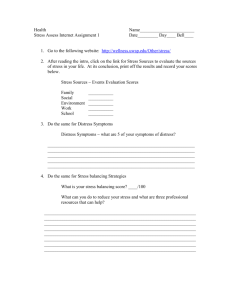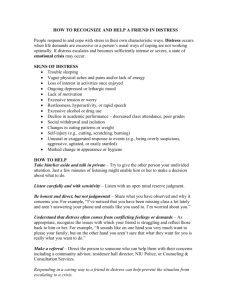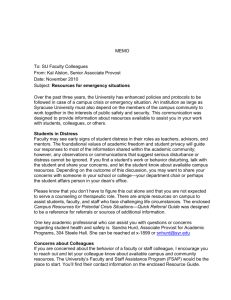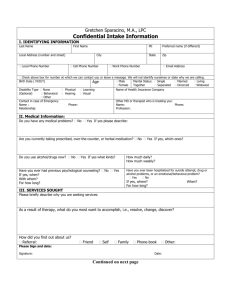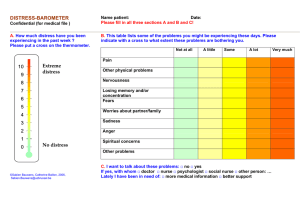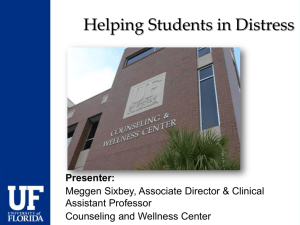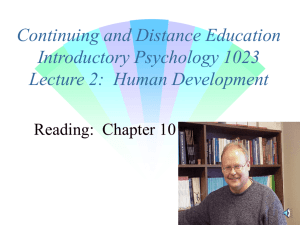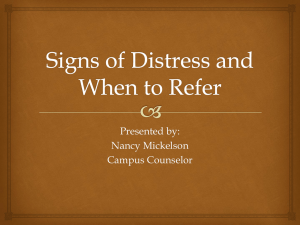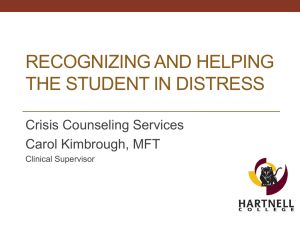How to Recognize and Report Behavior that Concerns
advertisement
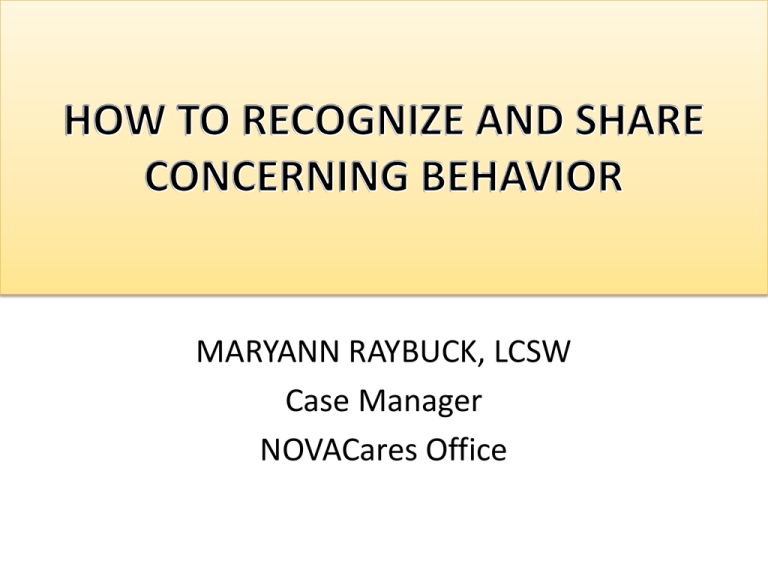
MARYANN RAYBUCK, LCSW Case Manager NOVACares Office Students in Distress NVCC does not offer counseling services, so the NOVACares office has developed a multi-tiered system to support students in need. play a vital part in this system. Staff & Faculty are frequently in the best position to notice and report student behavior. BSERVE ONNECT EPORT Be on the look out for signs of student distress. Reach out to the student to express concern. Report your concerns to NOVACares. The Power of You Students will often share personal information with professors, especially if it is impacting their grades. Report your concerns early! By reporting your low level concerns, we can intervene before a behavior becomes more serious. Early intervention is critically important in student retention and in keeping the college safe. What Are Your Seeing? Stress VS Distress A change from the norm is often a sign of a student in distress In performance In appearance/ hygiene In demeanor Additionally, any concerns about safety (the student’s or others) or about the emotional stability of a student should be reported. TYPES OF BEHAVIORS THAT MAY INDICATE DIFFICULTIES • Disruptive emotional outbursts • Aggressiveness (i.e. resentful, hostile, intimidating, harassing) • Extreme sensitivity, or anxiety • An inability to cope with challenges or disappointment • Statements that indicate distress or loss • An inability to cope or to self regulate their mood/ behavior • Expressions of hopelessness or worthlessness • Persecutory beliefs, “Grievance collecting” • Noticeable Injuries (cuts, burns, bruising) OUTSIDE THE CLASSROOM Concerning Communications Any emails, phone calls, texts, drawings or written assignments that suggest: – Delusions or paranoia – Victimization or abuse, – Self disdain or suicide ideation, – Bullying, persecution, or retaliation, – Preoccupation with weapons or violence; identification with mass murderers A Word on Disabilities. • Students may provide you with an MOA explaining the accommodations they need. • Students are not required to tell you why the MOA is in place and you are not to ask! • A disability does not excuse a student from adhering to the student code of conduct NOVACARES Campus Assessment, Response, and Evaluation EMERGENCIES When an individual • Is expressing a direct threat to themselves or others, • is acting in a bizarre and disconnected manner, • Or becomes highly agitated and irrational, TAKE STEPS TO ENSURE YOUR SAFETY AND CALL CAMPUS POLICE! NOVACARES • Please report your concerns on the NOVACares website. • Reports may be filed anonymously • Concerns about distressed students are forwarded to your campus CARE team. • Concerns about conduct issues are handled by the Dean or Conduct Officer. CAMPUS CARE TEAMS • A CARE team on every campus. • Focus is on supporting students in distress. • Assesses risk level, then develops and implements a response plan • CARE Team Members: Coordinator of Counseling (chair), Police, Student Services, Faculty, and Staff WHY REPORT? Your Report: • Allows us to identify individuals in need who might otherwise be overlooked. • Enables NOVA to assess individuals at risk, thereby increasing the safety of our College. • Allows us to track individuals with multiple reports across multiple campuses. • Prevents silos of information within departments and/or campuses. • Encourages a way to consistently respond to individuals of concern. NOVACares Resources • NOVA SAS: Free & confidential assistance for sexual assault, partner violence, stalking • ACCESS HOPE: Free or low cost counseling • WOUNDED WARRIOR PROGRAM: Assistance for Veterans, Spouses and Dependents. • NOVACares Website: http://www.nvcc.edu/novacares/index.html
